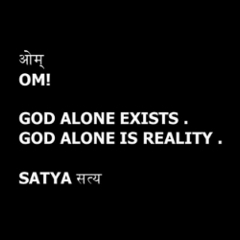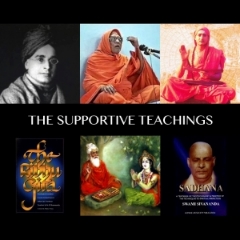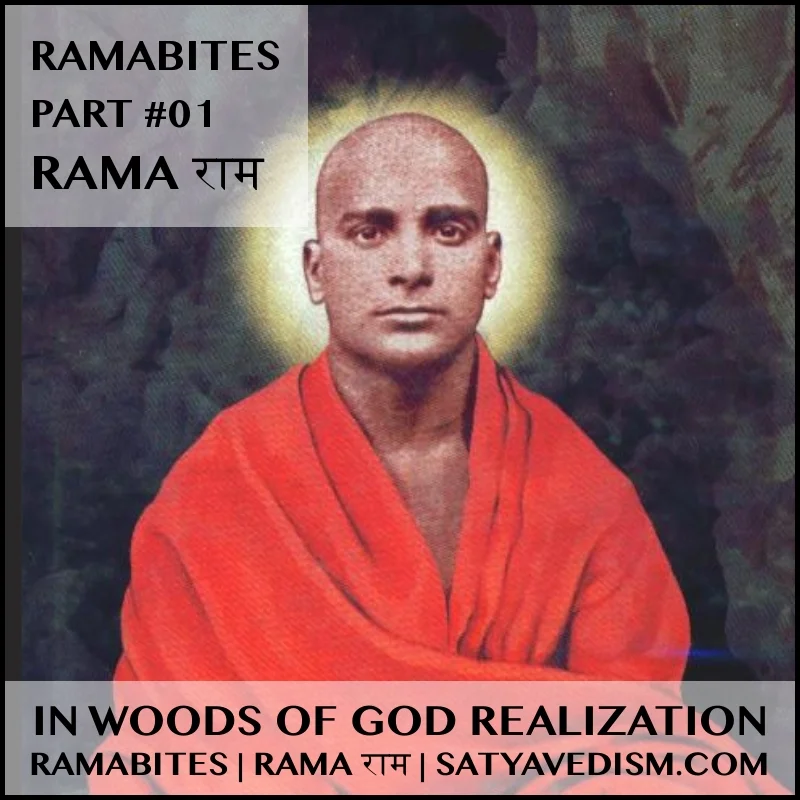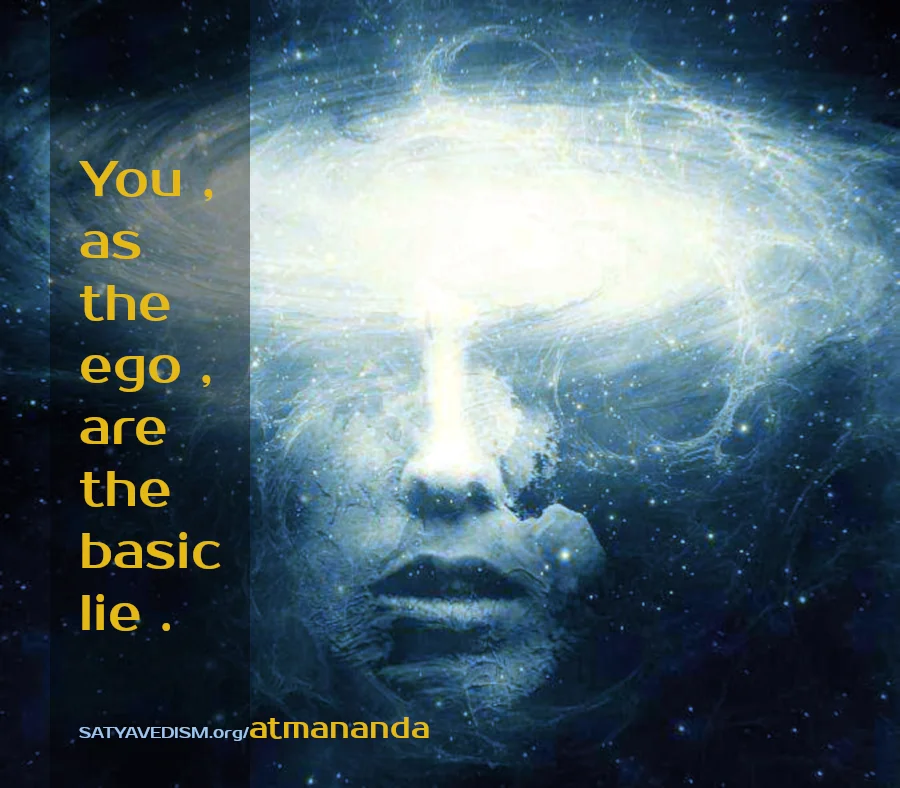THE SECRET OF SUCCESS | WORK | PART 1
| | homeTHE SECRET OF SUCCESS | AMERICA | IWGR I | RAMA राम
|| 1 OF 7 | FIRST PRINCIPLE : WORK ||
It is an open secret that work , attack , persistent application is the secret of success .
" Hammer on ! hammer on ! " is the first principle of success . Without work you can never succeed . A lazy person is bound to perish in the " struggle for existence " , one cannot live , one must die .
Here presents a question most commonly raised against Vedanta . How can you reconcile continuous labour with the unaffected , impersonal , pure nature of Self or Atman , as demonstrated by Vedanta ? Does not Vedanta lead to laziness and inaction by inculcating the realization of rest and peace of Divine Self and by preaching renunciation ?
This objection is due to the terrible misunderstanding of the nature of work or renunciation .
What is work ? Intense work , according to Vedanta , is rest . Here is a paradoxical statement , a startling statement ,
" Work is rest ." All true work is rest .
That is what Vedanta preaches . The greatest worker , when one is at the height of one's work , when one is doing one's best , just mark . In the eyes of others the worker is engaged in strenuous efforts , but examine from the worker's own standpoint , the worker is no doer .
Just as in the eyes of distant observers , the rainbow contains beautiful colours , examine it on the spot , there are no colours of any kind present therein .
The hero in war , say Napoleon or Washington or anybody , when the hero is fighting , doing the best , look at the hero . The body works automatically , as it were , the mind is absorbed in the work to such a degree that " I am working " is entirely gone , the small enjoying ego is absolutely lost , the credit-seeking little self is absent . This incessant work unwittingly leads you to the highest yoga .
Vedanta wants you to rise above the little self , the small ego through intense work . Let the body and mind be continuously at work to such a degree that the labour may not be felt at all .
A poet is inspired when above the idea of the little self or ego , when there is no thought of " I am writing poetry " .
Ask anybody who has had the experience of solving difficult problems in Mathematics , and you will be told that only then are problems solved and difficulties removed when the idea — " I am doing this " is entirely absent ; and the more one can rise above the little ego or the small self , the more glorious works come out of one .
Thus does Vedanta teach rising above the little ego by dint of earnest work and losing everything in the real indescribable principle which , according to Vedanta , is the real Self , Atman or GOD .
When a thinker , philosopher , poet , scientist or any worker attunes to a state of abstraction and rises to the heights of resignation to such a degree that no trace of personality is left within , and Vedanta is practically realized , then and then only does GOD , the Master Musician , take up in Its own hands the organ or instrument of the body and mind and send forth grand vibrations , sweet notes , exquisite symphonies out of one .
People say , " Oh , one is inspired ! "
whereas there is no I or me in one , no doing , no enjoying traceable from one's standpoint . This was realizing Vedanta in practical life . Thus all success flows from Vedanta being unknowingly put into practice .
There is no necessity of your retiring into the forests and pursuing abnormal practices to realize Vedantic Yoga . You are the parent of Yoga Shiva oneself , when you are lost in activity or merged in work .
According to Vedanta the body is not your Self , do you not see that you are at the height of glory , at your very best , only when in practice you realize this truth , and the body and mind become to you non-existent by virtue of intense exertion ?
What work is , will be explained by a lamp or light . Take a gas or oil lamp . The light is so glorious , so dazzling , so splendid , brilliant and bright . What is it that lends glory and lustre to the lamp ?
It is denying the ego through constant work .
Let the lamp try to spare its wick and oil , the lamp will be dark , all failure , no success . In order that there may be success , the lamp must burn , must not spare its wick and oil .
That is what Vedanta preaches . In order that you may have success , in order that you may prosper , you must through your acts , by your own everyday life , burn your own body and muscles , cremate them in the fire of use . You must use them .
You must consume your body and mind , put them in a burning state ; crucify your body and mind ; work and work and then will light shine through you . All work is nothing else but the burning of your wick and oil .
In other words , all work is nothing else but making your body and mind illusions , practically nothing from the standpoint of your own consciousness .
Rise above them and that is work .
All true work is accomplished when we rise above it .
Once there came two brave Hindu siblings to the court of Akbar , the great , an emperor of India . They requested to be employed by the ruler . The ruler inquired about their qualifications . They said they were heroes . The ruler asked them to give a proof of their heroism .
In Akbar's court they stood face to face ; off flashed their shining daggers , sharp-pointed daggers . Each of them placed the sharp end of the dagger against the breast of the sibling . Cheerfully and smilingly they ran to each other .
Their hands were steady , and the daggers were piercing through the bodies , but unflinchingly and calmly they approached each other , no swerving , no hesitating ; their souls united in heaven , their bodies met on earth and fell bleeding on the ground . A very queer proof of their heroism was given to the ruler .
That is an illustration of the fact that true work is accomplished only when the self-asserting worker is sacrificed .
Bees have to put their lives into the sting they give .
" The person who is one's own master knocks in vain at the doors of poetry " , says Plato .
Thus all prosperity and success come by living Vedanta in practice . Incessant work , incessant labour is the greatest Yoga for a person of the world . You are the greatest worker to the world when to yourself you are no worker .
Again in what mood and mode does successful work become natural for us ? It is very easy to say ,
" Work , work " , but it is very hard to work .
Everybody wants to become the greatest painter , everybody wants to become a great musician , but everybody does not become what everybody wants .
What is it that disposes you to inaction ? What is it that makes you enjoy labour ? Have you not found that oftentimes when you wished to work , you could not ?
Have you not observed that sometimes you did not like to labour and yet was splendid work done ? Have you not marked that there is something higher which governs your working capacity ?
How often one wakes up in the morning and finds oneself in a peculiar mood , a mood which is indescribable in perfect harmony with Nature ; one takes up one's pen and from the pen flows magnificent poetry or philosophy .
A painter tries to paint a beautiful picture but cannot , despite all struggles . Then one rises one morning and finds oneself inspired , as it were , and there one draws beautiful works of art . Is it not so ?
Thus we see that there is something higher which puts all your working powers at their best . If you avail yourself of that higher mood , you can always keep yourself at your best and the work through your hands will be perfect , most beautiful .
That higher mood or that higher secret Vedanta lays before you ; it is nothing else but being in perfect harmony with the universe , being in tune with the Divinity , practically living in the true Atman or GOD within you and being raised above the little ego or selfish desires .
Thus work can become wonderful by availing yourself of the secret of all light or power within you .
An artist or painter goes into the street , and there one sees many faces ; the eyes of one person charm , those eyes are unconsciously stored up in the mind ; one meets another person and the chin of that person impresses , one stores up that chin in the mind ; the eyes taken from one person and the chin stolen from another .
Another person comes to artist's shop to purchase a picture . A picture is sold to that person , the customer goes away with the picture , knows not that the customer has left the hair behind in the mind of the artist .
Then comes another person who wants the painter to do something for the person ; the painter does that something , but snatches the remarkable ears from this person , and so impersonally the mind of the painter is at work .
While the painter is appropriating the eyes , chin , nose , etc , of different people , the painter is not living in the idea that these are being taken , but impersonally , unconsciously , this work is being done .
After a few days the painter sits in the studio before the canvas . The painter wants to produce a striking portrait , and there the eyes of one person , the remarkable nose of another person , the attractive hair of another , all these are blended into one painting , and the artist brings out a most magnificent piece of work , a picture which excels all the originals .
How was this beautiful work of art done ? Was this work personal ? No , the work was impersonal .
All this work was done by living continually in a mood free from egotistical , selfish taint , above the " I am doing " mood .
Let the artist suffer from hatred or cupidity , oftentimes miscalled love ; the watch of the mind becomes magnetized , remains no longer in working order , is deranged or out of gear .
The impersonal tone of the artist's mood is lost , the artist is hypnotized into selfishness , the serene mood has disappeared , the Vedanta spirit which keeps us in touch with the All is replaced by limiting attachment or repulsion , and no longer can the artist's mind do the impersonal work of abstracting from the features of this person or that .
The practical Vedanta is gone , and gone with it is the master-power of producing exquisite work of art .
Thus you see that the more your work becomes impersonal and the more you rise above " I am doing " , the more you renounce the proprietary , copyrighting spirit , and the more you leave behind the accumulating , favour-currying spirit , the more you deny your unreal apparent self , the better will your work be .
Vedanta requires you to work for its own sake . In order that your work should be success , you should not mind the end , you should not care for the consequences or the result .
Let the means and the end be brought together , let the very work be your end .
Vedanta wants you to be at rest in your inner Self .
Let the inner Soul be at rest and the body be continually at work , the body subject to the laws of dynamics being in action , and the inner Self always at statical rest .
It is our selfish restlessness that spoils all our work .
Follow work for the sake of peace or nirvana connected with it .
PART #1 : WORK & http://bit.ly/1a19JK2
PART #2 : SACRIFICE & http://bit.ly/19bbbZm
PART #3 : LOVE & http://bit.ly/16BNzyd
PART #4 : CHEERFULNESS & http://bit.ly/14fne8c
PART #5 : FEARLESSNESS & http://bit.ly/153EzOW
PART #6 : SELF-RELIANCE & http://bit.ly/1bpouub
PART #7 : PURITY & http://bit.ly/167ANKy
SOURCE | SATYAVEDISM.ORG


































































































